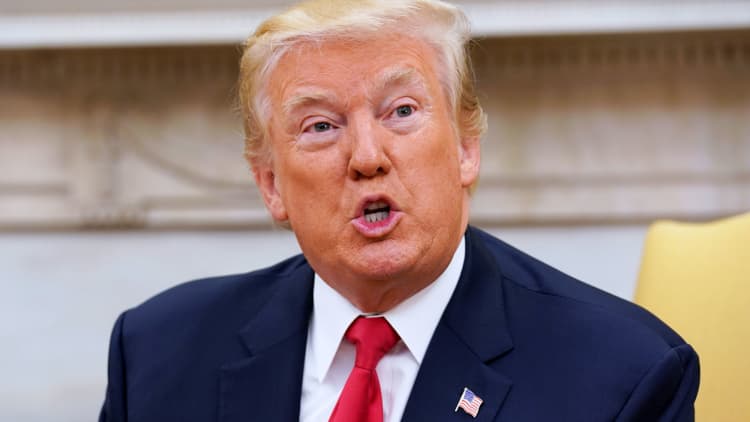
So far, markets have shrugged off the North Korea crisis just like White House turmoil. But the economic hazard, like the security threat, is coming more clearly into focus.
Each new North Korean missile test brings American officials closer to an excruciating choice: striking militarily to stop Pyongyang's nuclear program from endangering the U.S., or accepting the North Korean threat while scrambling for a new strategy.
"There are real potential economic consequences" either way, said Richard Haass, president of the Council on Foreign Relations. He called it "an enormous test" of a Trump administration weakened by disarray.
The Trump administration has signaled that military options, which would put the South Korean population as well as American troops stationed there in the line of fire, remain on the table. But Marine Gen. Joseph Dunford, chairman of the Joint Chiefs of Staff, has acknowledged the cost could be "a loss of life unlike any we have experienced in our lifetimes."

The duration, scope and intensity of such a conflict would be highly unpredictable. In addition to the toll in casualties, it could destabilize the entire Asia-Pacific region and, at minimum, severely strain the confidence of consumers and investors in the United States.
A second alternative is relying on pressure from North Korea's neighbor China. President Donald Trump has oscillated between promising that China could swiftly halt the North Korean nuclear program, to thanking China for trying unsuccessfully, to faulting China for "just talk." He tweeted that "we will no longer allow" China to keep profiting from trade with the U.S. without exerting great effort.
But China, which worries that substantially more pressure on North Korea could destabilize the regime and trigger a flood of refugees across their border, has made plain the limits of its cooperation. Should the Trump administration hit Chinese goods with import tariffs as a result, Beijing has retaliatory economic steps ready to go.
Nicholas Lardy, an expert on the Chinese economy at the Peterson Institute for International Economics, predicted China would take two specific steps. One would be sharply reducing purchases of U.S. soybeans, with the goal of driving down prices and squeezing U.S. farm exports; the other is cutting orders of U.S. airplanes manufactured by Boeing.
A third option is to adapt the approaches that previous administrations have used in vain: Sustaining sanctions and ramping up military deterrence while offering incentives for North Korea to enter negotiations with nations including Russia, China and Japan. Former national security aide Antony Blinken gives that approach no more than a 30 percent chance of success, but said it would avoid the "huge, huge risk" of military action.
The decades-long intractability of the North Korean problem has sent some aides to past administrations searching for new approaches. Jay Lefkowitz, an envoy to North Korea for President , advocates that the U.S. reassure China by abandoning its historic support for eventual Korean reunification; Jon Wolfsthal, a former Obama aide, wants the U.S. to shift from stopping North Korea's nuclear program to preventing it from using nuclear weapons.
A special challenge facing the Trump administration is coping with North Korea at a time when the administration is under-staffed and in disarray, from the White House to the State Department. The president himself has displayed limited patience, attention span and command of policy – important qualities for handling complex problems like North Korea.
"We'll handle North Korea," Trump said at a Cabinet meeting Monday. "We're going to be able to handle them. It will be handled. We handle everything."
To minimize potential costs, former Clinton and Obama national security adviser Jim Steinberg said, Trump and his team need to "play the long game" of sustained pressure and diplomacy – without overreacting.
"We have to make sure," he concluded, "that the cure is not worse than the disease."
WATCH: Trump talks economy, N. Korea at Cabinet meeting



